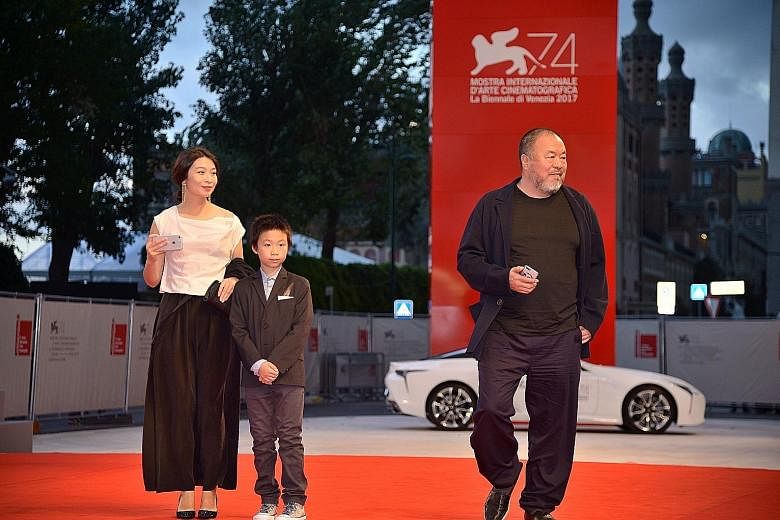Ai Weiwei, China's most famous living artist and dissident, wants to prick your conscience with his Oscar-shortlisted documentary Human Flow, a heartbreaking look at the growing global refugee crisis.
The 60-year-old - who helped come up with the iconic bird's nest design for China's Olympic stadium - has been moved by the plight of refugees to create works of art before, in 2016 draping a Berlin concert hall with 14,000 life jackets that had been used by refugees fleeing to Greece.
Speaking at a screening of his new film in Los Angeles last Saturday, Ai explains that his connection to the issue is a personal one: He is a displaced person himself - the son of Ai Qing, a celebrated Chinese poet exiled by the government during the Cultural Revolution.
"The year I was born, 1957, my father was named an enemy of the state, so we stayed for 20 years in a very remote area of north-west China," says the artist, who now lives in Berlin.
"Later, I went to the United States for 12 years, in the 1980s, then went back to China for another 20 years, and in that 20 years… I started to write articles on my blog criticising the political conditions (in China) and as a result I was detained for years and beaten, and I couldn't get my passport.
"So all that is background to why I care about the situation (of refugees)," says Ai, who is married to artist Lu Qing, 53, and has a six-year-old son from another relationship.
The scope of today's refugee problem - which is accelerating because of wars in the Middle East and Africa as well as climate change - is the first point his film makes.
"It's too big to cope with. Sixty-five million or more people have refugee status today," he says, adding that the average length of stay in a refugee camp is 26 years.
Ai, who visited refugees in more than 40 camps in over 20 nations to make the movie, attempts to show what an extended period in such camps does to the human spirit.
"Once you've been named a refugee, you're not really (seen as) human. You're kind of sub-human, you're being forgotten, people look at you as a nobody, you're stateless, but living at somebody else's mercy.
"It's not an easy condition, especially for children, who don't have an education. For adults, they don't have a job. They cannot bring back bread, nobody tells them how long or what their day is going to be, or if it's going to be any different from any other day they've had for years."
And their misery continues because the rest of the world turns a blind eye, he believes. "It's the neglect of nations and politicians. We basically forget them. We pretend we don't know or that they simply don't exist."
There will be even more refugees as climate change forces people to uproot themselves, he points out.
"The conditions we live in today are quite fragile and easily destroyed. And we're dealing with a system that does not have compassion. We lost it to capitalism, which says if you're successful you don't have to care about others."
Above all, Ai wants to remind people that many of them are also descended from those who once migrated, were displaced or were otherwise forced to start from scratch.
"Of those 65 million or more refugees, not a single one was willing to give up their home when they had a peaceful life, till one day that peace was disturbed and they had to give up everything. This is not a simple act, it's a very courageous act.
"But this is not the first time in human history (we've seen this). We all come from somewhere, we just don't remember it. Our grandparents or parents all had this same kind of past. They had to say goodbye to their home, make a long journey and go somewhere where they didn't know the language or customs."
A civilised society, he adds, would design a way for people like this to be accepted and to make their lives easier.
He declines to comment when pressed on what specific policies he would recommend for this; he acknowledges that these are important, but suggests that his job as an artist is to move the human heart.
"Of course it takes political decisions to relook the concept of refugees and come up with clear policies or steps.
"It's not realistic to (fully) open our borders, but the borders in our heart and mind should be open. We should understand the humanity and come up with policies with a better understanding of human beings.
"We have to talk about the human condition, human rights and that's the way we would create a better world for other people."
He also concedes the limitations of documentaries such as his.
"The conditions that we see in the film are pretty images; the reality is much worse.
"You live outside, you cannot find a place to go to the toilet or have a shower, it's freezing, you don't have light or warm water, you could be wet and cold. It's hard to describe it.
"I don't recommend to anybody to go see those kinds of locations. I've produced a film which is kind of beautiful, but which has nothing to do with reality. It's much worse than this."

